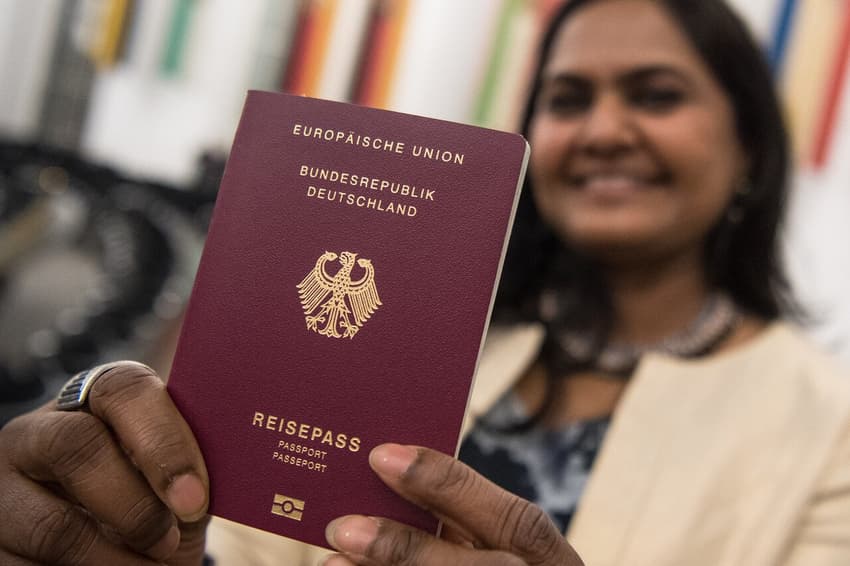8 reasons why German citizenship trumps permanent residency

Many foreign nationals who've managed to gain a permanent residency permit may be wondering whether it's worth going that one step further to become a German citizen. Here are 8 reasons why it is.
1. Once a German, always a German
Once you become a German citizen, you stay one forever. The only way you can lose your German citizenship is if you renounce it in order to become a citizen of another country.
This means that, unlike permanent residency holders, German citizens can come and go as they please and can live outside of Germany for as long as they like without having to fill out any paperwork on their return.
Though some types of permanent residency mean you can technically stay forever in Germany, you generally can’t leave the country for more than six months without having to reapply.
Even those who have lived in Germany for more than 15 years, are married to a German or have a German child under 18 will still have to fill out a form when re-entering a country.
But if you become a German citizen, you’ll never have to set foot in an Ausländerbehörde again. For many people, that fact alone should be enough of an incentive to become German.
READ ALSO: How long can you leave Germany for without losing permanent residency?
2. The right to vote
Though citizens of other EU countries living in Germany have the right to vote in local elections, only German citizens can vote in federal or state elections.

A voter puts his ballot paper into a ballot box at a voting station in Mecklenburg-Western Pomerania at the federal elections 2021. Photo: picture alliance/dpa | Stefan Sauer
That means that, even if you’ve lived in Germany for 20 years, if you’re not a citizen, you won’t have a say in who runs your state government or who the next Chancellor should be.
3. Access to all professions
In Germany, there are certain jobs that only German citizens can do. If you’ve always dreamed of working in a German Bürgeramt (a local authority office), for example, having German citizenship is the only way you’ll earn yourself a place behind one of those coveted desks.
If you fancy a career in German politics, you'll also need to be a German passport holder, as German citizenship is a requirement for becoming a member of the Bundestag and - if you're really dreaming big - for becoming German Chancellor.
4. The rights of an EU citizen
On becoming German, you also become a citizen of the European Union. If your country of origin is outside of the EU, that can be a big plus point, as being an EU citizen means you have the right to live, work and study in any other European country.

The EU flag waves in the wind in front of the Reichstag building in Berlin. Photo: picture alliance/dpa | Monika Skolimowska
5. Easier travel to other countries
As well as making it easier to work and travel within the EU, having a German passport will make travel to other countries easier too.
If your country of origin is outside the EU, if travelling to certain countries – like the USA – you usually need to make sure you've got a visa before jetting off.
READ ALSO: How powerful is the German passport?
But German citizens can travel to 190 countries or territories where they either don’t need a visa - or they can get one on arrival - making Germany one of the 5 most powerful passports in the world. Internationally, only the passports of South Korea, Singapore, and Japan score higher than the German passport for this level of travel freedom.
6. Your children will become German citizens, even if they’re born outside of Germany
If you’ve been living in Germany on a permanent basis for at least eight years (this will change to five years under the new citizenship law), your children born in Germany will get German citizenship. This rule doesn’t apply if they are born outside of Germany, however.
READ ALSO: When is my child entitled to German citizenship?
But the children of at least one German citizen can be born anywhere in the world and will automatically qualify for a German passport.
7. Easier access to credit
At many banking institutes, being a German citizen is a requirement in order to take out large loans - especially if you're hoping to get a mortgage to get your foot on the housing ladder. Though having permanent residency status often makes it easier to take out large loans, many banking institutions stipulate that you must be a German passport holder to be given credit.
READ ALSO: What to know about mortgages and fees when buying property in Germany
8. The magical feeling of being "German"
While gaining a permanent residency is, rightly, a bureaucratic achievement to be proud of, it just doesn't compare to the feeling of officially becoming German.
Naturalisation comes with a deeper sense of belonging and, for many, getting that Einbürgerungsurkunde (citizenship certificate) and seeing the word "Deutsch" in their passport is a truly emotional experience, as means becoming part of the German family for life.
Also, as Germany is currently in the process of changing its citizenship law (the Bundestag has now passed it), soon it will become the case that non-EU nationals will be able to have dual citizenship, which means you'll be able to enjoy the feeling of being Deutsch without having to give up your current passport.
READ ALSO: KEY POINTS - What you need to know about Germany's citizenship law reform
Comments (1)
See Also
1. Once a German, always a German
Once you become a German citizen, you stay one forever. The only way you can lose your German citizenship is if you renounce it in order to become a citizen of another country.
This means that, unlike permanent residency holders, German citizens can come and go as they please and can live outside of Germany for as long as they like without having to fill out any paperwork on their return.
Though some types of permanent residency mean you can technically stay forever in Germany, you generally can’t leave the country for more than six months without having to reapply.
Even those who have lived in Germany for more than 15 years, are married to a German or have a German child under 18 will still have to fill out a form when re-entering a country.
But if you become a German citizen, you’ll never have to set foot in an Ausländerbehörde again. For many people, that fact alone should be enough of an incentive to become German.
READ ALSO: How long can you leave Germany for without losing permanent residency?
2. The right to vote
Though citizens of other EU countries living in Germany have the right to vote in local elections, only German citizens can vote in federal or state elections.

That means that, even if you’ve lived in Germany for 20 years, if you’re not a citizen, you won’t have a say in who runs your state government or who the next Chancellor should be.
3. Access to all professions
In Germany, there are certain jobs that only German citizens can do. If you’ve always dreamed of working in a German Bürgeramt (a local authority office), for example, having German citizenship is the only way you’ll earn yourself a place behind one of those coveted desks.
If you fancy a career in German politics, you'll also need to be a German passport holder, as German citizenship is a requirement for becoming a member of the Bundestag and - if you're really dreaming big - for becoming German Chancellor.
4. The rights of an EU citizen
On becoming German, you also become a citizen of the European Union. If your country of origin is outside of the EU, that can be a big plus point, as being an EU citizen means you have the right to live, work and study in any other European country.

5. Easier travel to other countries
As well as making it easier to work and travel within the EU, having a German passport will make travel to other countries easier too.
If your country of origin is outside the EU, if travelling to certain countries – like the USA – you usually need to make sure you've got a visa before jetting off.
READ ALSO: How powerful is the German passport?
But German citizens can travel to 190 countries or territories where they either don’t need a visa - or they can get one on arrival - making Germany one of the 5 most powerful passports in the world. Internationally, only the passports of South Korea, Singapore, and Japan score higher than the German passport for this level of travel freedom.
6. Your children will become German citizens, even if they’re born outside of Germany
If you’ve been living in Germany on a permanent basis for at least eight years (this will change to five years under the new citizenship law), your children born in Germany will get German citizenship. This rule doesn’t apply if they are born outside of Germany, however.
READ ALSO: When is my child entitled to German citizenship?
But the children of at least one German citizen can be born anywhere in the world and will automatically qualify for a German passport.
7. Easier access to credit
At many banking institutes, being a German citizen is a requirement in order to take out large loans - especially if you're hoping to get a mortgage to get your foot on the housing ladder. Though having permanent residency status often makes it easier to take out large loans, many banking institutions stipulate that you must be a German passport holder to be given credit.
READ ALSO: What to know about mortgages and fees when buying property in Germany
8. The magical feeling of being "German"
While gaining a permanent residency is, rightly, a bureaucratic achievement to be proud of, it just doesn't compare to the feeling of officially becoming German.
Naturalisation comes with a deeper sense of belonging and, for many, getting that Einbürgerungsurkunde (citizenship certificate) and seeing the word "Deutsch" in their passport is a truly emotional experience, as means becoming part of the German family for life.
Also, as Germany is currently in the process of changing its citizenship law (the Bundestag has now passed it), soon it will become the case that non-EU nationals will be able to have dual citizenship, which means you'll be able to enjoy the feeling of being Deutsch without having to give up your current passport.
READ ALSO: KEY POINTS - What you need to know about Germany's citizenship law reform
Join the conversation in our comments section below. Share your own views and experience and if you have a question or suggestion for our journalists then email us at [email protected].
Please keep comments civil, constructive and on topic – and make sure to read our terms of use before getting involved.
Please log in here to leave a comment.